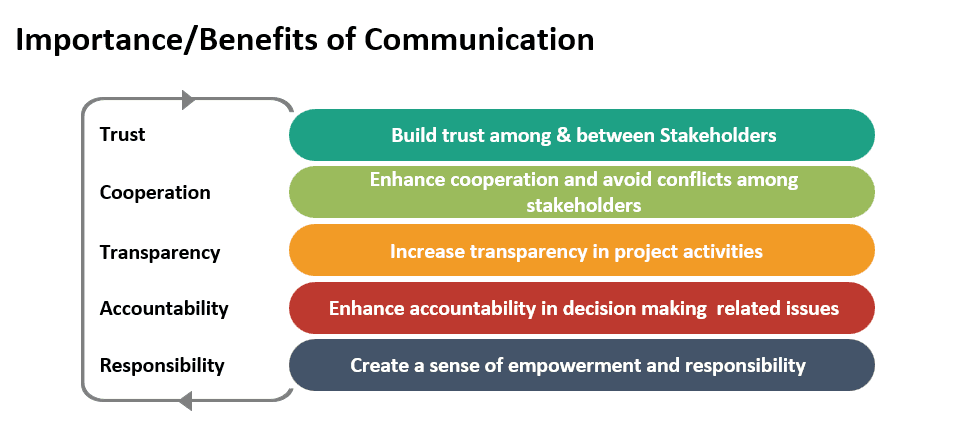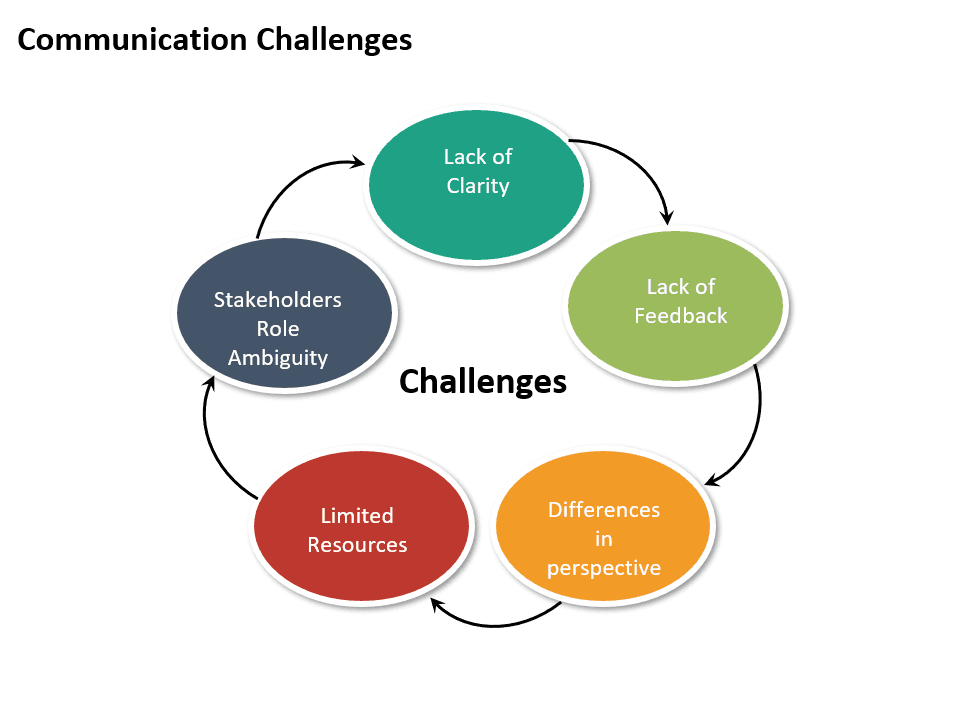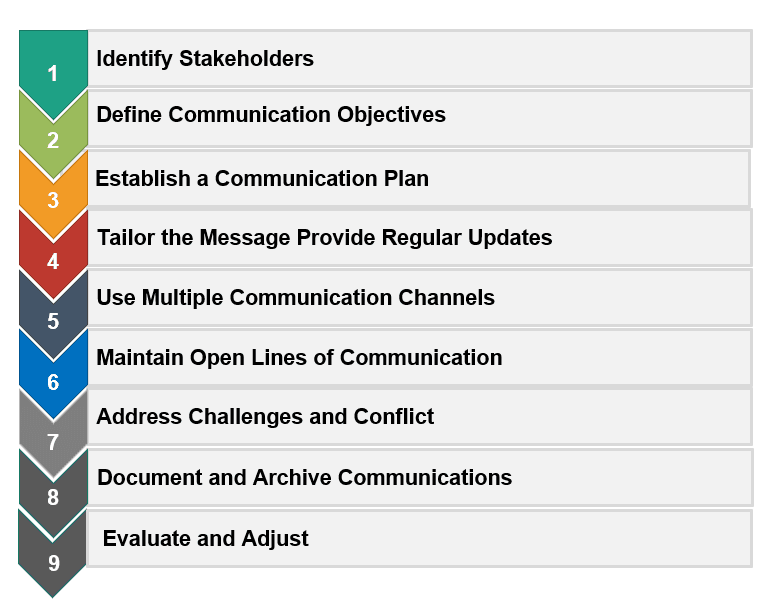- Authors
- Written by :
- Name
- Deepika Gupta
Effective Stakeholders' Communication Strategies & Best Practices
- Published on
- Published On:
Overview
In any project, effective communication with stakeholders is essential for success. Stakeholders are individuals or groups vested in the project's outcome. According to McElroy and Mills, project management teams must identify stakeholders who can affect the project and manage their demands throughout its stages. To ensure effective communication with stakeholders, it is crucial to use appropriate means of communication.
Importance of effective communication
Effective communication with stakeholders is crucial for the success of any project. Stakeholders are individuals, groups, or organisations who may affect or impact a project's decisions, activities, or outcomes.
They play a vital role in project success, providing valuable input, resources, and support throughout the project lifecycle. Organisations must develop a stakeholder communication plan to connect with their stakeholders, understand their needs and expectations, and keep them informed about project progress.

Poor communication with stakeholders can have a detrimental impact on project outcomes. When stakeholders are not effectively engaged or informed, it can lead to misunderstandings, delays, and conflicts. Inadequate communication can result in missed deadlines, budget overruns, and scope creep, jeopardising the overall success of the project.
On the other hand, effective communication ensures that stakeholders receive relevant information, understand project goals and objectives, and build positive attitudes towards the project and the organisation. Regular and transparent communication with stakeholders is essential to maintain their support and engagement throughout the project
- Engaging Stakeholders for Project Success from www.pmi.org
- How To Create an Effective Stakeholder Communication from www.indeed.com
- What Are the Benefits of Stakeholder Communication? from smallbusiness.chron.com
- How To Improve Communication On Your Projects from www.brightwork.com/blog/tackle-poor-project-communication
Challenges
Communication can often be a critical factor in determining the success of a project. From my experience, some of the common challenges in implementing effective communication strategies with stakeholders include the following:

- Lack of Clarity: Ambiguous or unclear communication can significantly hinder effective stakeholder communication. Ensuring your message is clear and understandable to all parties involved is essential.
- Lack of Feedback: Feedback from stakeholders is crucial for effective communication and collaboration. However, stakeholders may only sometimes provide feedback, which can cause communication gaps and make it more challenging to achieve project success.
- Differences in perspective: Stakeholders may have different expectations or goals for the project. Ensuring everyone is aligned with the same goals and vision can be challenging.
- Limited Resources: Another challenge is managing communication with stakeholders when resources are limited. For example, a small team may need help communicating with many stakeholders.
- Stakeholders' Role Ambiguity: Role ambiguity is a source of conflicts, low productivity and disengagement. Also, team members with unclear responsibilities will tend to underperform and blame their lack of productivity on this apparent confusion.
Strategies
To ensure effective stakeholder communication, project managers should tailor their communication strategies to meet the needs and preferences of different stakeholders.
Here are some strategies to help ensure effective communication with stakeholders:

- Identify Stakeholders:
- Identify all the individuals and groups with an interest or influence in the project. This includes project team members, clients, support, end-users, and other relevant parties.
- Internal Stakeholders: Who are the Key People within Your Organization?
- internal stakeholders
- Executives and Senior Leadership
- Decision-makers
- Managers and Team Leads
- Department managers, project managers, team leaders
- Executives and Senior Leadership
- internal stakeholders
- External Stakeholders: Understanding the External Influencers on Your Project or Organization
- Customers and Clients
- Potential customers, existing clients
- Partners
- Vendors, suppliers
- Regulators and Government Agencies
- Governing bodies related to your industry or project scope
- Internal Stakeholders: Who are the Key People within Your Organization?
- Identify all the individuals and groups with an interest or influence in the project. This includes project team members, clients, support, end-users, and other relevant parties.
- Define Communication Objectives:
- Clearly define the objectives of your communication with stakeholders. Are you seeking their input, updating them on project progress, or requesting their approval? Having clear objectives will help you tailor your communication messages accordingly.
- Establish a Communication Plan:

- Step 1: Defining Your Objectives and Audience
- Communication objectives, target audience, stakeholder analysis, message development
- Step 2: Choosing the Right Communication Channels and Tools
- Communication channels, communication tools, digital communication platforms, social media marketing tools
- Step 3: Developing a Timeline and Setting Clear Deadlines
- Communication timeline, project management software, meeting deadlines in the communication plan
- Step 4: Crafting Compelling Messages that Resonate with Your Audience
- Message creation, persuasive messaging techniques, and storytelling in the communication plan
- Step 5: Implementing and Monitoring Your Communication Plan's Effectiveness
- Implementation of a communication plan, tracking metrics and analytics in communications strategy
Reference: https://project-management.com/communication-plan/
- Tailor the Message:
- Customise your message for each stakeholder group. Consider their knowledge, interests, and communication preferences. Doing so ensures your message resonates with each stakeholder and addresses their concerns or needs.
- Provide Regular Updates:
- Keep stakeholders informed about the project's progress through regular updates. This helps build transparency and trust, as stakeholders feel involved and aware of any changes or challenges.
- Create and share Weekly Status Progress report
- Keep stakeholders informed about the project's progress through regular updates. This helps build transparency and trust, as stakeholders feel involved and aware of any changes or challenges.
- Use Multiple Communication Channels:
- Utilise various communication channels to reach stakeholders. This can include
- face-to-face meetings
- Emails
- Project management software or tools(JIRA, ASANA, Trello etc)
- And other digital tools.
- Utilise various communication channels to reach stakeholders. This can include
Different stakeholders may have different preferences, so catering to their preferred channels is essential.
- Maintain Open Lines of Communication:
- Encourage stakeholders to share their opinions, concerns, and feedback throughout the project.
- Create an environment where stakeholders feel comfortable expressing themselves, and ensure their opinions are acknowledged and considered.
- Address Challenges and Conflict:
- Address any challenges or conflicts openly and promptly.
- Be proactive in resolving issues that may arise with stakeholders, and communicate any changes or adjustments to the project plan as necessary.
- Document and Archive Communications:
- Record all stakeholder communication, including meeting minutes, emails, and other documentation. This helps maintain transparency and accountability and is a reference for future project reviews or audits.
- Use Confluence, Google Drive and any tool to keep all documents centralised and easy to access by all stakeholders.
- Evaluate and Adjust:
- Regularly evaluate the effectiveness of your communication efforts with stakeholders.
- Seek stakeholder feedback and adjust your communication strategies to ensure continuous improvement.
By following these strategies, you can establish effective communication channels with stakeholders, build positive relationships, and increase the likelihood of project success.
Reference: https://www.pmi.org/learning/library/communications-strategy-complex-program-work-6639
Conclusion
In conclusion, effective stakeholder communication is crucial for project success. Stakeholders play a vital role in the success of a project, as they have a vested interest in its outcomes. Poor communication with stakeholders can harm project outcomes, leading to delays, misunderstandings, and conflicts.
Therefore, project managers must develop effective communication strategies to ensure all stakeholders are informed, engaged, and aligned with project goals. By doing so, projects can be completed successfully, meeting the expectations and requirements of all stakeholders involved.
